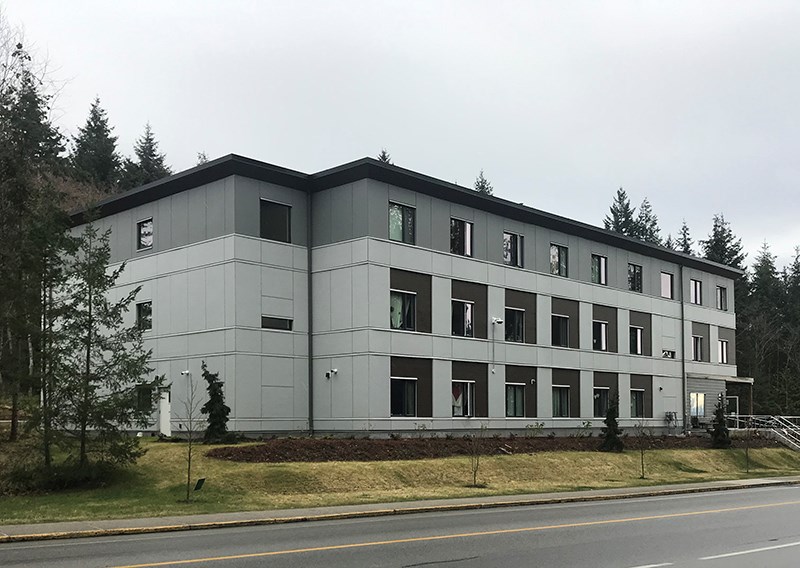Lift Community Services has responded to a story regarding an arrest at the supportive housing complex near Powell River General Hospital by outlining efforts being made in Powell River to deal with complex social issues.
Lift Community Services executive director Stuart Clark, in a written response to a February 25 media release from the RCMP and a Peak online story, highlighted the response by community agencies to deal with people needing various supports. The media release in question outlined the execution of a search warrant and charges faced after a supportive housing resident was found with illicit drugs and a prohibited weapon.
Clark stated that after more than a year of the supportive housing program here in Powell River, and in the midst of the unprecedented public health emergencies of the COVID-19 pandemic and the overdose crisis, it is unfortunate that this is the story people are reading about in the community newspaper.
“Although not intended to mislead, the story glosses over the progress made by our community agencies and provincial partners to tackle the issues of poverty, homelessness and overdose deaths in our community, and instead frames this issue as a threat to public safety and a dangerous criminal matter,” stated Clark. “This framing will only make matters worse by compounding stigma about provincial supportive housing programs and people who use substances, which in turn makes it more difficult for health professionals to reach those in need.”
Clark stated it should come as no surprise to anyone that there is drug trafficking in the community, or any community in BC for that matter.
“This is becoming more obvious now that we are in the throes of a devastating overdose crisis in BC,” stated Clark. “The COVID-19 pandemic has compounded the impacts of the crisis, bringing deaths in our province to a record high of 1,716 deaths, a 74 percent increase from 2019. Our community, unfortunately, has the second-highest death rate per capita in the Vancouver Coastal Health region, second only to Vancouver.
“Given these harrowing facts, it has become clear to communities and their governments all across BC that now is the time to take a very different approach to making our communities safer, and to end the criminalization of drugs and the people who use them,” added Clark. “The provincial health officer of BC Dr. Bonnie Henry, the City of Vancouver, the City of Squamish, the City of Kamloops and the City of Powell River have all recently issued statements and written letters asking the federal government to end the criminalizing approach to addressing this crisis.”
Clark stated that a February 12 letter written to the federal minister of health by Powell River mayor Dave Formosa requested that the federal government take steps to “…reduce drug-related fatalities and stigma, such as legal regulations of illicit drugs to ensure safe supply of pharmaceutical alternatives to toxic street drugs and decriminalization.”
“The adverse effects of substance use is only one of many intersecting systemic issues our vulnerable community members are facing, and focusing on it alone will not create community safety and wellness,” stated Clark. “Issues such as homelessness, poverty, mental illness and discrimination are equally devastating to our community, and much like for people who use drugs, the negative impacts of these issues are compounded by the dual health crises of the opioid epidemic and the COVID-19 pandemic.
“What is needed right now is ongoing support for the community agencies and provincial partners (Lift Community Services, Vancouver Coastal Health, City of Powell River, BC Housing, members of the Community Action Team and the Poverty Reduction Task Force, to name a few) to continue our multiagency, comprehensive, evidence-based approach to addressing these complex issues and ensuring the safety and well-being for all who live here.”
Clark stated in the past year alone, Lift Community Services has worked with City of Powell River and BC Housing to temporarily end homelessness in the qathet region, and is continuing with that work in 2021 to make that a permanent reality.
“We have collaborated with the City of Powell River and First Credit Union to launch a poverty reduction strategy that aims to address the systemic barriers in our community that prevent community members from moving out of poverty,” stated Clark. “Our work with the provincial supportive housing program and our partners at VCH has helped connect countless Powell River citizens to health and other community services, which has created many positive outcomes, including creating new sustainable employment opportunities.
“In our work with the Community Action Team, a community table of over 60 agencies working to end the overdose crisis in our region, we have worked tirelessly in our community to prevent deaths and connect more people to treatment options than ever before. This work by our local Community Action Team has been recognized as one of the leading examples in BC of how a community can work together to address a complex and life-threatening community issue.”
Clark stated that Lift calls on all levels of government to continue to invest in health services and community agencies working to reduce the adverse impacts of drug use, mental illness, discrimination, homelessness and poverty.
“We remain committed to working with RCMP and other partners to continue ensuring Powell River remains a safe, caring and welcoming place for all,” stated Clark.

